
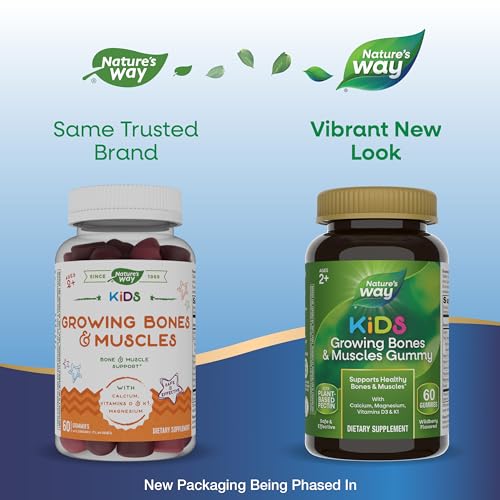
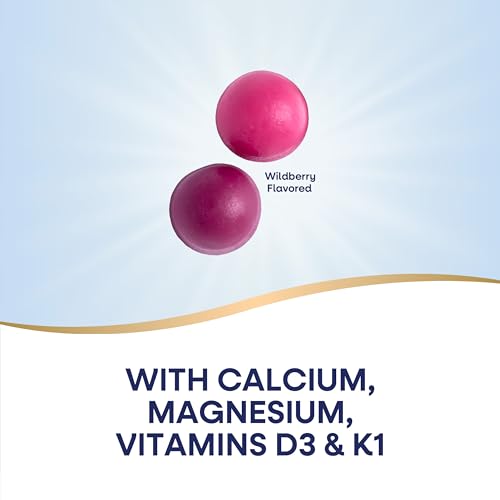
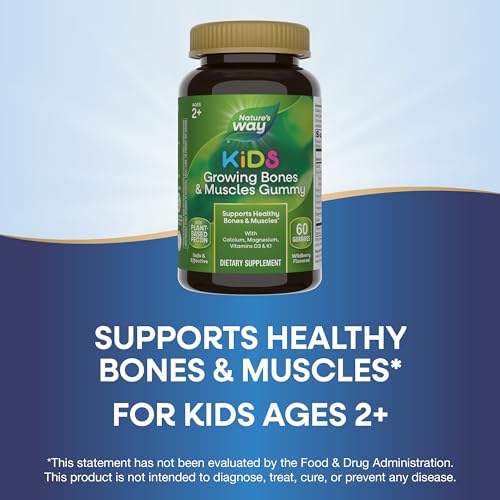
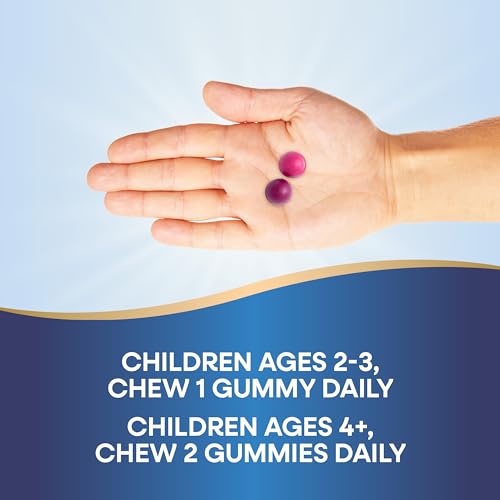
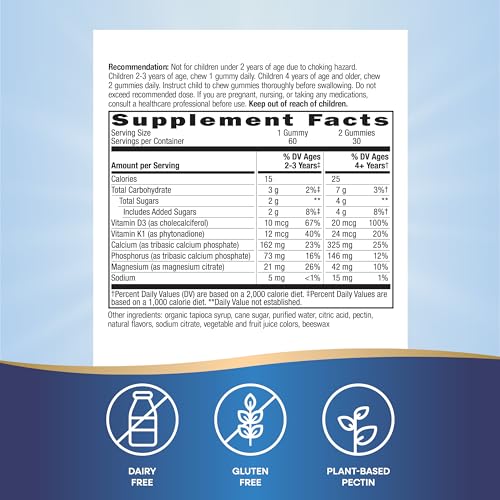
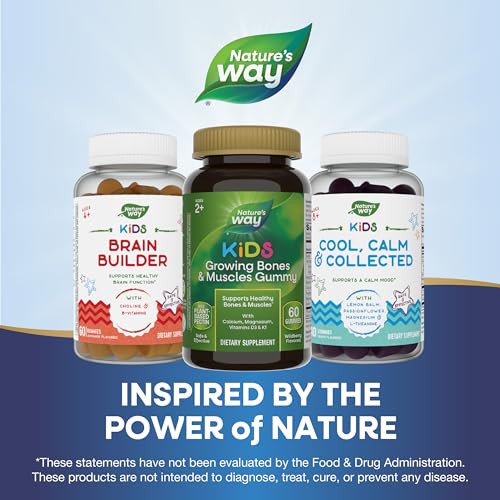
Nature's Way Kids Vitamins Bundle - Supports Healthy Bones & Muscles, Wildberry Flavor - 60 Gummies


Vitamin D3
High RiskVitamin D3, also known as cholecalciferol, is a fat-soluble vitamin important for calcium metabolism and bone health. It is synthesized in the skin upon exposure to sunlight and is also found in some foods and supplements. Its primary function is to promote the absorption of calcium and phosphorus in the body.
Sustai Insights
Vitamin D3 offers functional benefits such as supporting bone health and immune function. However, excessive intake can lead to toxicity, presenting risks like hypercalcemia. Environmental concerns include its potential for bioaccumulation. Regulatory bodies impose usage restrictions due to these risks, resulting in a high overall risk assessment. Safe usage practices should be observed, and alternatives such as vitamin D2 may be considered.
Citric Acid
Medium RiskCitric acid is an alpha hydroxy acid used in personal care products primarily for its role as a pH adjuster and natural preservative. It occurs naturally in citrus fruits and is commonly utilized in various formulations for its chelating properties and mild exfoliation benefits.
Sustai Insights
Citric acid offers functional benefits as an effective preservative and pH stabilizer, contributing to product longevity and stability. It is biodegradable and derived from renewable sources. Health risks are low, with minimal concerns regarding carcinogenicity, allergies, and reproductive toxicity. However, moderate use restrictions exist due to potential irritation at high concentrations. Environmental risks are limited, as citric acid is not known to accumulate in ecosystems. Regulatory agencies have no significant advisories against its use. Overall, it is assessed as a medium-risk ingredient, with safe usage practices recommended and alternatives available.
Magnesium Citrate
Low RiskMagnesium citrate is a magnesium salt of citric acid, commonly used in cosmetic formulations as a stabilizing agent and to enhance product texture. It aids in moisture retention and can contribute to the overall effectiveness of various cosmetic products.
Sustai Insights
Magnesium citrate serves functional benefits by stabilizing formulations and improving texture, while its low risk profile suggests minimal health hazards, including low concerns for carcinogenicity, allergies, and reproductive toxicity. Environmentally, it presents low risks as a pollutant or bioaccumulative substance. Regulatory bodies impose few restrictions, indicating a favorable status. Safe usage practices are recommended, with alternatives available such as magnesium chloride or magnesium sulfate for similar benefits. Overall, the assessment concludes a low risk associated with magnesium citrate.
Beeswax, Yellow
Low RiskBeeswax, yellow, is a natural wax produced by honeybees, primarily composed of esters of fatty acids and long-chain alcohols. It serves as an emulsifier, thickener, and stabilizer in cosmetic formulations, contributing to texture and consistency. It is commonly used in creams, balms, and lip products.
Sustai Insights
Beeswax provides functional benefits such as enhancing product texture and acting as a natural emulsifier, while also being biodegradable and sustainably sourced. Health risks are minimal, with low concerns for carcinogenicity, allergies, or irritations. Environmental impacts are also low, as it does not bioaccumulate. Regulatory status remains favorable with no current restrictions. Overall, the ingredient poses low risk, making it a suitable choice in cosmetic formulations.
Apple Pectin
Low RiskApple pectin is a natural polysaccharide found in the cell walls of apples. It is commonly used as a gelling agent, thickener, and stabilizer in food products, as well as in cosmetics and pharmaceuticals. Its gelling properties are utilized to improve texture and consistency.
Sustai Insights
Apple pectin serves as an effective thickener and stabilizer, contributing to the texture of various products. It is biodegradable and derived from renewable sources, enhancing its sustainability profile. Health risks are minimal, with low concerns for carcinogenicity, allergies, or reproductive toxicity. Environmental impact is also low, with no known pollutants or bioaccumulation issues. Regulatory status is clear, with no current restrictions. Overall, the risk level associated with apple pectin is low, making it a safe ingredient for use in formulations.
Cocos Nucifera (Coconut) Oil
Low RiskCocos Nucifera (Coconut) Oil is derived from the kernels of the coconut palm. It is primarily used in cosmetic formulations for its emollient and moisturizing properties, making it suitable for skin and hair care products.
Sustai Insights
Coconut oil serves as an effective moisturizer and emollient, promoting skin hydration and softness. It is sustainably sourced and biodegradable. Health risks are minimal, with low concerns regarding carcinogenicity, allergens, and reproductive toxicity. Environmental impact is also low, as it does not contribute significantly to pollution or bioaccumulation. Regulatory bodies have not issued restrictions on its use. Overall, coconut oil presents a low risk for health and environmental concerns, making it a safe ingredient in cosmetic products.
Vitamin K
Low RiskVitamin K is a fat-soluble vitamin essential for various bodily functions, primarily known for its role in blood coagulation and bone metabolism. It exists in two main forms: K1 (phylloquinone) found in green leafy vegetables and K2 (menaquinone) found in fermented foods and animal products. It is commonly used in dietary supplements and food products.
Sustai Insights
Vitamin K has functional benefits, including promoting healthy blood clotting and supporting bone health. It is generally regarded as safe, with low concerns regarding carcinogenicity, allergies, or reproductive toxicity. Environmental risks are minimal, and it is not classified as a pollutant. Regulatory agencies do not impose significant restrictions on its use, resulting in an overall low-risk assessment. Safe usage practices include adhering to recommended dietary guidelines. Alternatives such as vitamin K-rich foods are readily available, supporting a sustainable approach to health.
Sodium Citrate
Low RiskSodium citrate is used in cosmetic formulations primarily as a buffering agent, helping to stabilize pH levels. It is derived from citric acid and is commonly found in various personal care products to enhance their efficacy and stability.
Sustai Insights
Sodium citrate offers functional benefits such as effective pH regulation and acts as a mild preservative. It is generally recognized as safe with low risks for cancer, allergies, and reproductive toxicity. Environmental concerns are minimal, with no significant pollutant potential or bioaccumulation. Regulatory bodies like the FDA and COSMOS have no major restrictions on its use. Overall, sodium citrate presents a low risk, making it a viable ingredient in cosmetic formulations. Safe usage practices should be followed, and alternatives are not typically necessary.
Sodium
Low RiskSodium is a chemical element commonly used in various products, primarily as a preservative and stabilizing agent. It is involved in numerous reactions, contributing to the overall functionality and safety of formulations.
Sustai Insights
Sodium serves as an effective preservative, helping to extend product shelf life. It is generally recognized as safe with low concerns for carcinogenicity, allergies, and reproductive toxicity. However, excessive exposure may lead to health issues like hypertension. Environmentally, sodium is considered low risk regarding pollution and bioaccumulation. Regulatory bodies have not imposed significant restrictions on its use. Overall, the risk associated with sodium is low, making it a suitable ingredient with no major health or environmental concerns.
Tricalcium Phosphate
Low RiskTricalcium phosphate is an inorganic salt composed of calcium and phosphate, commonly used as a dietary supplement and a food additive. It serves as a source of calcium, an anti-caking agent, and a filler in various products.
Sustai Insights
Tricalcium phosphate offers functional benefits as a calcium source, supporting bone health and serving as an effective anti-caking agent in food products. Its environmental impact is low, with no known pollutant potential or bioaccumulation concerns. Health risks are minimal, categorized as low for irritants and allergens, with no significant regulatory warnings. Overall, it presents a low-risk profile for consumers, making it a viable ingredient in various applications.
Magnesium Citrate
Low RiskMagnesium citrate is a magnesium salt of citric acid, commonly used in cosmetic formulations as a stabilizing agent and to enhance product texture. It aids in moisture retention and can contribute to the overall effectiveness of various cosmetic products.
Sustai Insights
Magnesium citrate serves functional benefits by stabilizing formulations and improving texture, while its low risk profile suggests minimal health hazards, including low concerns for carcinogenicity, allergies, and reproductive toxicity. Environmentally, it presents low risks as a pollutant or bioaccumulative substance. Regulatory bodies impose few restrictions, indicating a favorable status. Safe usage practices are recommended, with alternatives available such as magnesium chloride or magnesium sulfate for similar benefits. Overall, the assessment concludes a low risk associated with magnesium citrate.
Beeswax, Yellow
Low RiskBeeswax, yellow, is a natural wax produced by honeybees, primarily composed of esters of fatty acids and long-chain alcohols. It serves as an emulsifier, thickener, and stabilizer in cosmetic formulations, contributing to texture and consistency. It is commonly used in creams, balms, and lip products.
Sustai Insights
Beeswax provides functional benefits such as enhancing product texture and acting as a natural emulsifier, while also being biodegradable and sustainably sourced. Health risks are minimal, with low concerns for carcinogenicity, allergies, or irritations. Environmental impacts are also low, as it does not bioaccumulate. Regulatory status remains favorable with no current restrictions. Overall, the ingredient poses low risk, making it a suitable choice in cosmetic formulations.
Vitamin D3
High RiskVitamin D3, also known as cholecalciferol, is a fat-soluble vitamin important for calcium metabolism and bone health. It is synthesized in the skin upon exposure to sunlight and is also found in some foods and supplements. Its primary function is to promote the absorption of calcium and phosphorus in the body.
Sustai Insights
Vitamin D3 offers functional benefits such as supporting bone health and immune function. However, excessive intake can lead to toxicity, presenting risks like hypercalcemia. Environmental concerns include its potential for bioaccumulation. Regulatory bodies impose usage restrictions due to these risks, resulting in a high overall risk assessment. Safe usage practices should be observed, and alternatives such as vitamin D2 may be considered.
Apple Pectin
Low RiskApple pectin is a natural polysaccharide found in the cell walls of apples. It is commonly used as a gelling agent, thickener, and stabilizer in food products, as well as in cosmetics and pharmaceuticals. Its gelling properties are utilized to improve texture and consistency.
Sustai Insights
Apple pectin serves as an effective thickener and stabilizer, contributing to the texture of various products. It is biodegradable and derived from renewable sources, enhancing its sustainability profile. Health risks are minimal, with low concerns for carcinogenicity, allergies, or reproductive toxicity. Environmental impact is also low, with no known pollutants or bioaccumulation issues. Regulatory status is clear, with no current restrictions. Overall, the risk level associated with apple pectin is low, making it a safe ingredient for use in formulations.
Cocos Nucifera (Coconut) Oil
Low RiskCocos Nucifera (Coconut) Oil is derived from the kernels of the coconut palm. It is primarily used in cosmetic formulations for its emollient and moisturizing properties, making it suitable for skin and hair care products.
Sustai Insights
Coconut oil serves as an effective moisturizer and emollient, promoting skin hydration and softness. It is sustainably sourced and biodegradable. Health risks are minimal, with low concerns regarding carcinogenicity, allergens, and reproductive toxicity. Environmental impact is also low, as it does not contribute significantly to pollution or bioaccumulation. Regulatory bodies have not issued restrictions on its use. Overall, coconut oil presents a low risk for health and environmental concerns, making it a safe ingredient in cosmetic products.
Citric Acid
Medium RiskCitric acid is an alpha hydroxy acid used in personal care products primarily for its role as a pH adjuster and natural preservative. It occurs naturally in citrus fruits and is commonly utilized in various formulations for its chelating properties and mild exfoliation benefits.
Sustai Insights
Citric acid offers functional benefits as an effective preservative and pH stabilizer, contributing to product longevity and stability. It is biodegradable and derived from renewable sources. Health risks are low, with minimal concerns regarding carcinogenicity, allergies, and reproductive toxicity. However, moderate use restrictions exist due to potential irritation at high concentrations. Environmental risks are limited, as citric acid is not known to accumulate in ecosystems. Regulatory agencies have no significant advisories against its use. Overall, it is assessed as a medium-risk ingredient, with safe usage practices recommended and alternatives available.
Vitamin K
Low RiskVitamin K is a fat-soluble vitamin essential for various bodily functions, primarily known for its role in blood coagulation and bone metabolism. It exists in two main forms: K1 (phylloquinone) found in green leafy vegetables and K2 (menaquinone) found in fermented foods and animal products. It is commonly used in dietary supplements and food products.
Sustai Insights
Vitamin K has functional benefits, including promoting healthy blood clotting and supporting bone health. It is generally regarded as safe, with low concerns regarding carcinogenicity, allergies, or reproductive toxicity. Environmental risks are minimal, and it is not classified as a pollutant. Regulatory agencies do not impose significant restrictions on its use, resulting in an overall low-risk assessment. Safe usage practices include adhering to recommended dietary guidelines. Alternatives such as vitamin K-rich foods are readily available, supporting a sustainable approach to health.
Sodium Citrate
Low RiskSodium citrate is used in cosmetic formulations primarily as a buffering agent, helping to stabilize pH levels. It is derived from citric acid and is commonly found in various personal care products to enhance their efficacy and stability.
Sustai Insights
Sodium citrate offers functional benefits such as effective pH regulation and acts as a mild preservative. It is generally recognized as safe with low risks for cancer, allergies, and reproductive toxicity. Environmental concerns are minimal, with no significant pollutant potential or bioaccumulation. Regulatory bodies like the FDA and COSMOS have no major restrictions on its use. Overall, sodium citrate presents a low risk, making it a viable ingredient in cosmetic formulations. Safe usage practices should be followed, and alternatives are not typically necessary.
Sodium
Low RiskSodium is a chemical element commonly used in various products, primarily as a preservative and stabilizing agent. It is involved in numerous reactions, contributing to the overall functionality and safety of formulations.
Sustai Insights
Sodium serves as an effective preservative, helping to extend product shelf life. It is generally recognized as safe with low concerns for carcinogenicity, allergies, and reproductive toxicity. However, excessive exposure may lead to health issues like hypertension. Environmentally, sodium is considered low risk regarding pollution and bioaccumulation. Regulatory bodies have not imposed significant restrictions on its use. Overall, the risk associated with sodium is low, making it a suitable ingredient with no major health or environmental concerns.
Tricalcium Phosphate
Low RiskTricalcium phosphate is an inorganic salt composed of calcium and phosphate, commonly used as a dietary supplement and a food additive. It serves as a source of calcium, an anti-caking agent, and a filler in various products.
Sustai Insights
Tricalcium phosphate offers functional benefits as a calcium source, supporting bone health and serving as an effective anti-caking agent in food products. Its environmental impact is low, with no known pollutant potential or bioaccumulation concerns. Health risks are minimal, categorized as low for irritants and allergens, with no significant regulatory warnings. Overall, it presents a low-risk profile for consumers, making it a viable ingredient in various applications.
Unlock your child's potential with Nature's Way Kids Growing Bones & Muscles Gummies! These delightful wildberry-flavored gummies are designed to support healthy bones and muscles in children ages 2 and up, making nutrition fun and effective.
- Essential Nutrients: Packed with calcium, vitamin D3, K1, and magnesium, these gummies provide the key ingredients for strong bones and muscles during critical growth years.
- Safe & Trustworthy: With over 50 years of experience, Nature's Way ensures quality, purity, and safety, making them a trusted choice for families.
- Plant-Based & Allergen-Free: Made with plant-based pectin, these gluten-free and vegetarian gummies contain no dairy, eggs, peanuts, gelatin, or soy, catering to diverse dietary needs.
- Easy to Incorporate: Simply give one gummy to children ages 2-3 and two gummies to those 4 and older daily. Chewing thoroughly maximizes nutrient absorption.
- Commitment to Nature: Nature’s Way believes in the power of natural ingredients, fostering wellness while supporting sustainable practices.
Empower your child's health with a delicious daily treat that builds a strong foundation for their future!
Subscribe & Save with Sustai
- Best Price Guarantee: Always enjoy the lowest prices on sustainable home essentials.
- No Surprises: We’ll notify you before shipping. No hidden fees, ever.
- You’re in Charge: Change, pause, or cancel your subscription anytime with ease.
- Eco-Friendly Deliveries: Our grouped shipments mean less packaging and lower emissions.
Join us on a sustainable journey. Special offers for a limited time! Prices and promotions may change.
Recommended Products
Unlock your child's potential with Nature's Way Kids Growing Bones & Muscles Gummies! These delightful wildberry-flavored gummies are designed to support healthy bones and muscles in children ages 2 and up, making nutrition fun and effective.
- Essential Nutrients: Packed with calcium, vitamin D3, K1, and magnesium, these gummies provide the key ingredients for strong bones and muscles during critical growth years.
- Safe & Trustworthy: With over 50 years of experience, Nature's Way ensures quality, purity, and safety, making them a trusted choice for families.
- Plant-Based & Allergen-Free: Made with plant-based pectin, these gluten-free and vegetarian gummies contain no dairy, eggs, peanuts, gelatin, or soy, catering to diverse dietary needs.
- Easy to Incorporate: Simply give one gummy to children ages 2-3 and two gummies to those 4 and older daily. Chewing thoroughly maximizes nutrient absorption.
- Commitment to Nature: Nature’s Way believes in the power of natural ingredients, fostering wellness while supporting sustainable practices.
Empower your child's health with a delicious daily treat that builds a strong foundation for their future!

You can have at most 2 Sustainable Steals products in your cart
Customer Reviews
Customers’ View
Customers generally express satisfaction with the Kids' Gummies, highlighting their appealing wildberry flavor and the product's ability to support healthy bone and muscle development. Many parents appreciate the low added sugar content, making these gummies a nutritious option for their active children, especially those involved in sports. A common theme in reviews is the product's kid-friendly nature, with one parent noting, 'My kids love these gummies!' Additionally, the use of plant-based pectin and allergen-free ingredients resonates well with health-conscious families. Some customers mention minor issues, such as the gummies sticking together, but overall, parents feel confident in the quality and safety of this supplement, reinforcing its place in their children's daily health routines.
AI-generated from the text of customer reviewsThis product is rated 4.2 of 5.0 stars.
It has received 6 reviews.




